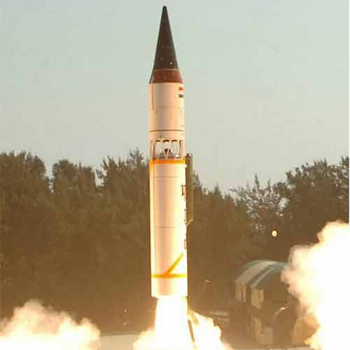
Odisha, Jan 31: India on Friday successfully test-fired its indigenously developed, intercontinental surface-to-surface nuclear capable ballistic missile "Agni-5", which has a strike range of over 5000 kms and can carry a nuclear warhead of over one tonne, from Wheeler's Island off Odisha coast.
The three stage, solid propellant "missile was test-fired from a mobile launcher from the launch complex-4 of the Integrated Test Range (ITR) at about 8.06 hours," ITR Director M V K V Prasad said.
Prasad told that the canister version of Agni-5 missile was successfully test launched today.
"The missile, witnessed a flawless 'auto launch' and detailed results will be known after all data retrieved from different radars and network systems."
An eye-witness said, "The sleek missile, just within a few seconds of its blast-off from the Island launchpad roared majestically into a clear sunny sky leaving behind in its trajectory a trail of thin orange and white column of smoke and within seconds it pierced the sky".
Today's launch was the third developmental trial of the long range missile. The first test was conducted on 19 April, 2012 and the second test on 15 September, 2013 from the same base.
The indigenously developed surface-to-surface missile Agni-5 is capable of striking a range more than 5000 km. It is about 17 meters long, 2 metres wide and has a launch weight of around 50 tonnes. The missile can carry a nuclear warhead of more than one tonne.
Unlike other missiles of Agni series, the latest one
"AGNI-5", is most advanced having some new technologies incorporated with it in terms of navigation and guidance, warhead and engine, Prasad said.
"Lot of new technologies developed indigenously were successfully tested in the first Agni-5 trial. The very high accuracy Ring Laser Gyro based Inertial Navigation System (RINS) and the most modern and accurate Micro Navigation System (MINS) had ensured the Missile reach the target point within few meters of accuracy.
"The high speed onboard computer and fault tolerant software along with robust and reliable bus guided the missile flawlessly," said an official.
India has at present in its armoury of Agni series, Agni-1 with 700 km range, Agni-2 with 2000 km range, Agni-3 and Agni-4 with 2500 km to more than 3500 range. After a few more trials, Agni-5 will be inducted into the services.





Comments
Add new comment